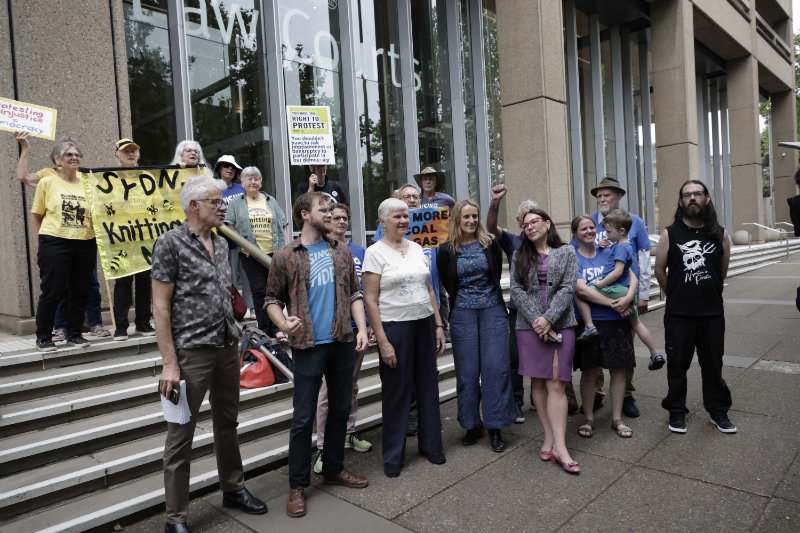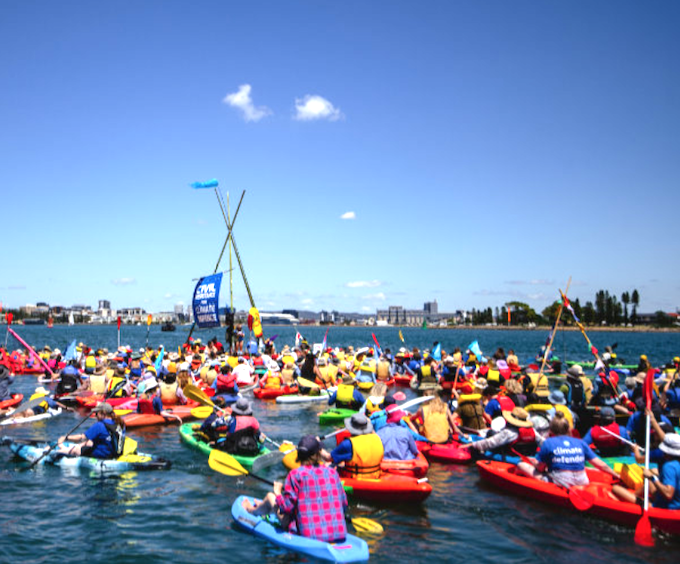Rising Tide climate crisis ‘Protestival’ to go ahead despite court ruling
The NSW Supreme Court has issued orders prohibiting a major climate protest that would blockade ships entering the world’s largest coal port in Newcastle for 30 hours. Despite the court ruling, APMN member Wendy Bacon reports that the protest will still go ahead next week.
SPECIAL REPORT: By Wendy Bacon
In a decision delivered last Thursday, Justice Desmond Fagan in the NSW Supreme Court ruled in favour of state police who applied to have the Rising Tide ‘Protestival’ planned from November 22 to 24 declared an “unauthorised assembly”.
Rising Tide has vowed to continue its protest. The grassroots movement is calling for an end to new coal and gas approvals and imposing a 78 percent tax on coal and gas export profits to fund and support Australian workers during the energy transition.
The group had submitted what is known as a “Form 1” to the police for approval for a 30-hour blockade of the port and a four-day camp on the foreshore.
- READ MORE: Other Australia coal and protest report
- COP29: Pacific countries cannot be conveniently pigeonholed
If approved, the protest could go ahead without police being able to use powers of arrest for offences such as “failure to move on” during the protest.
Rising Tide organisers expect thousands to attend of whom hundreds would enter the water in kayaks and other vessels to block the harbour.
Last year, a similar 24-hour blockade protest was conducted safely and in cooperation with police, after which 109 people refused to leave the water in an act of peaceful civil disobedience. They were then arrested without incident. Most were later given good behaviour bonds with no conviction recorded.
Following the judgment, Rising Tide organiser Zack Schofield said that although the group was disappointed, “the protestival will go ahead within our rights to peaceful assembly on land and water, which is legal in NSW with or without a Form 1.”
Main issue ‘climate pollution’
“The main public safety issue here is the climate pollution caused by the continued expansion of the coal and gas industries. That’s why we are protesting in our own backyard — the Newcastle coal port, scene of Australia’s single biggest contribution to climate change.”
In his judgment, Justice Desmond Fagan affirmed that protesting without a permit is lawful.
In refusing the application, he described the planned action as “excessive”.
“A 30-hour interruption to the operations of a busy port is an imposition on the lawful activities of others that goes far beyond what the people affected should be expected to tolerate in order to facilitate public expression of protest and opinion on the important issues with which the organisers are concerned,” he said.
During the case, Rising Tide’s barrister Neal Funnell argued that in weighing the impacts, the court should take into account “a vast body of evidence as to the cost of the economic impact of global warming and particularly the role the fossil fuel industry plays in that.“
But while agreeing that coal is “extremely detrimental to the atmosphere and biosphere and our future, Justice Fagan indicated that his decision would only take into account the immediate impacts of the protest, not “the economic effect of the activity of burning coal in power plants in whatever countries this coal is freighted to from the port of Newcastle”.

NSW Police argued that the risks to safety outweighed the right to protest.
Rising Tide barrister Neal Funnell told the court that the group did not deny that there were inherent risks in protests on water but pointed to evidence that showed police logs revealed no safety concerns or incidents during the 2023 protest.
Although he accepted the police argument about safety risks, Justice Fagan acknowledged that the “organisers of Rising Tide have taken a responsible approach to on-water safety by preparing very thorough plans and protocols, by engaging members of supportive organisations to attend with outboard motor driven rescue craft and by enlisting the assistance of trained lifeguards”.
The Court’s reasons are not to be understood as a direction to terminate the protest.
NSW government opposition
Overshadowing the case were statements by NSW Premier Chris Minns, who recently threatened to make costs of policing a reason why permits to protest could be refused.
Overshadowing the case were statements by NSW Premier Chris Minns, who recently threatened to make costs of policing a reason why permits to protest could be refused.
Last week, Minns said the protest was opposed because it was dangerous and would impact the economy, suggesting further government action could follow to protect coal infrastructure.
“I think the government’s going to have to make some decisions in the next few weeks about protecting that coal line and ensuring the economy doesn’t close down as a result of this protest activity,” he said.
Green MP and spokesperson for climate change and justice Sue Higginson, who attended last year’s Rising Tide protest, said, “ It’s the second time in the past few weeks that police have sought to use the court to prohibit a public protest event with the full support of the Premier of this State . . . ”
Higginson hit back at Premier Chris Minns: “Under the laws of NSW, it’s not the job of the Premier or the Police to say where, when and how people can protest. It is the job of the Police and the Premier to serve the people and work with organisers to facilitate a safe and effective event.
“Today, the Premier and the Police have thrown this obligation back in our faces. What we have seen are the tactics of authoritarian politics attempting to silence the people.
“It is telling that the NSW Government would rather seek to silence the community and protect their profits from exporting the climate crisis straight through the Port of Newcastle rather than support our grassroots communities, embrace the right to protest, take firm action to end coal exports and transition our economy.”
Limits of police authorised protests
Hundreds of protests take place in NSW each year using Form 1s. Many other assemblies happen without a Form 1 application. But the process places the power over protests in the hands of police and the courts.
In a situation in which NSW has no charter of human rights that protects the right to protest, Justice Fagan’s decision exposes the limits of the Form 1 approach to protests.
NSW Council for Civil Liberties is one of more than 20 organisations that supported the Rising Tide case.
In response to the prohibition order, its vice-president Lidia Shelly said, “Rising Tide submitted a Form 1 application so that NSW Police could work with the organisers to ensure the safety of the public.
“The organisers did everything right in accordance with the law. It’s responsible and peaceful protesting. Instead, the police dragged the organisers to Court and furthered the public’s perception that they’re acting under political pressure to protect the interests of the fossil fuel industry.”
Shelly said, “In denying the Form 1, NSW Police have created a perfect environment for mass arrests of peaceful protestors to occur . . .
“The right to peaceful assembly is a core human right protected under international law. NSW desperately needs a state-based charter of human rights that protects the right to protest.
“The current Form 1 regime in New South Wales is designed to repress the public from exercising their democratic rights to protest. We reiterate our call to the NSW Government to repeal the draconian anti-protest laws, abolish the Form 1 regime, protect independent legal observers, and introduce a Human Rights Act that enshrines the right to protest.”
Wendy Bacon is an investigative journalist who was professor of journalism at University of Technology Sydney (UTS). She worked for Fairfax, Channel Nine and SBS and has published in The Guardian, New Matilda, City Hub and Overland. She has a long history in promoting independent and alternative journalism, and is a committee member of APMN. She is a long-term supporter of a peaceful BDS movement and the Greens. Republished with Wendy's permission.

Post a reply